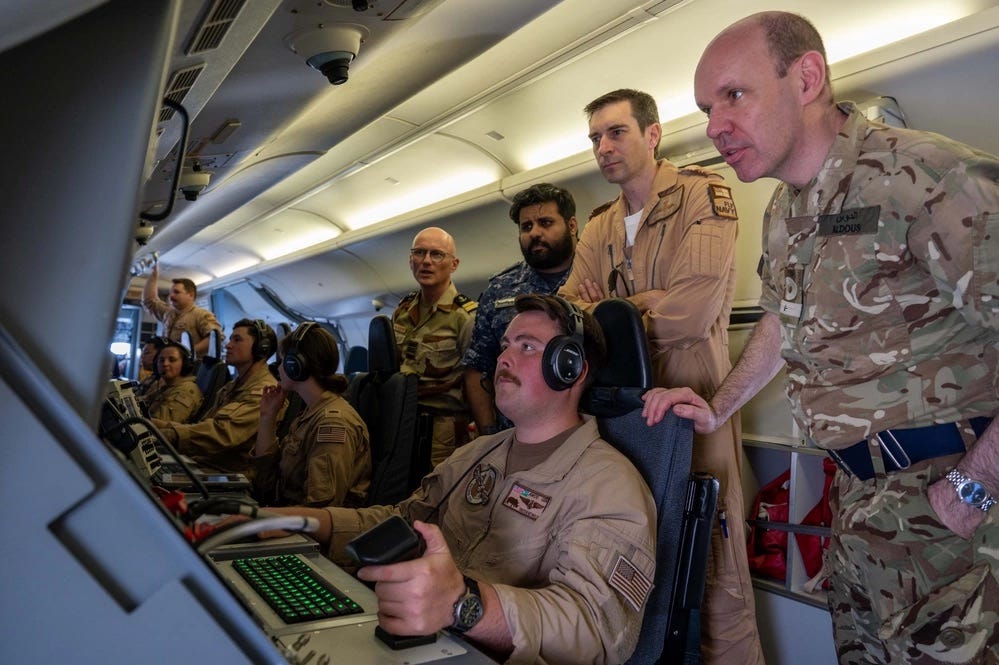White House: Iran and Russia in talks on more advanced drones; Pentagon steps up patrols to deter Iran harassment in Strait of Hormuz
“We’re going to increase the patrols in the neighborhood to ensure that we are seen, and that Iran clearly gets the message that we will not stand for this type of aggressive behavior,” DoD spokesman

Iran and Russia are in discussions about Iran selling more advanced drones to Russia, the White House alleged on Monday, part of what it called an “unprecedented,” two-way Iranian/Russian military partnership.
The U.S. allegations of deepening Iranian/Russian defense collaboration came as the Pentagon said it was stepping up patrols in the Strait of Hormuz to try to deter increasing Iranian harassment and seizure of maritime vessels.
It also came as senior State Department and Pentagon officials were due to give a classified briefing on Iran to all Senators on Tuesday* afternoon. One U.S. official indicated, however, that the briefing was not prompted by some new incident, but rather was the first time it could be scheduled since the US and Iranian-backed groups exchanged tit for tat action in Syria in late March.
“We continue to see indications that Iran and Russia are expanding their unprecedented defense partnerships,” National Security Council spokesman John Kirby told journalists on a virtual gaggle today (May 15).
Kirby: ‘This is a full scale defense partnership’
Kirby said Iran is now Russia’s top military backer. Since August, he said, Iran has provided Russia some 400 one-way, attack unmanned aerial vehicles (UAVs), many of which Russia has used to target Ukrainian critical infrastructure.
Now, Kirby said, the U.S. has indications that Iran and Russia are in consultations for Iran to provide Russia more advanced drones.
“Interactions between Iran and Russia in matters regarding the selling of advanced weapons, especially more advanced UAVs, are now continuing,” Kirby said.
“If Iran proceeds with selling these additional and more advanced UAVs to Russia, which have also been used to target U.S. personnel in the Middle East, there is every reason to believe that Russia will use them to continue its attacks against Ukrainian targets, causing more Ukrainian casualties,” he said.
And support is flowing both ways, Kirby said.
“Russia has been offering Iran unprecedented defense cooperation,” including on electronics and air defense, Kirby said. “Last month, Iran announced that it had finalized a deal to buy SU-35 fighter jets from Russia. Iran is seeking to purchase additional military equipment from Russia, including attack helicopters, radars and Yak-130 combat trainer aircraft. In total, Iran is seeking billions of dollars’ worth of military equipment from Russia.”
“This is a full scale defense partnership,” Kirby said, one “that is harmful to Ukraine, to the region in the Middle East, and to the international community.”
Pentagon: Stepping up patrols in Strait of Hormuz
The Pentagon said Monday that U.S. Central Command and the Fifth Fleet, working in coordination with allies and regional partners, would be stepping up the tempo of their patrols and presence in the Strait of Hormuz in order to try to deter Iranian harassment of maritime vessels.
“The U.S. will increase the rotation of in-theater assets patrolling the Strait of Hormuz, with the intent of bolstering our vigilance and our presence at this… maritime choke point,” Pentagon spokesman Brig. Gen. Pat Ryder told journalists at the Pentagon on Monday. “These assets will include manned and unmanned aerial platforms, as well as surface naval vessels from the Navy, the Coast Guard, to help enhance our maritime surveillance.”
Ryder demurred when asked about the possibility of the U.S. moving additional assets to the Middle East. “The focus right now will be on increasing the rotation of the in-theater assets,” he said.
“We’re going to increase the patrols in the neighborhood to ensure that we are seen and that Iran clearly gets the message that we will not stand for this type of aggressive behavior. And again, it’s not the United States by itself. We’re working closely with our regional partners.”
The NSC’s Kirby previewed additional, forthcoming U.S. actions to try to counter Iranian weapons shipments to Russia.
“We are using the tools at our disposal to expose and disrupt these activities and we are prepared to do more,” Kirby said. “We will… continue to impose costs on the actors involved in the transfer of Iranian military equipment to Russia.”
“We have issued numerous designations in recent months targeting Russia, Iran and third country actors involved in this activity,” he said. “And in the coming days, we will be announcing additional designations against those involved in the increased military trade between Russia and Iran.”
“We also will be announcing soon new steps to help governments and businesses better understand the risks posed by Iran’s UAV program and the illicit practices that Iran uses to procure components for it.”
Correction: The classified briefing for all Senators on Iran is scheduled for Tuesday (May 16), not Monday.
**


